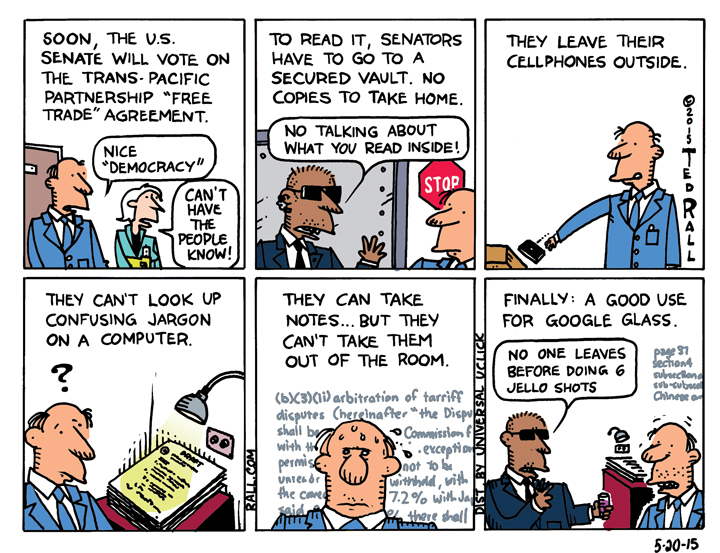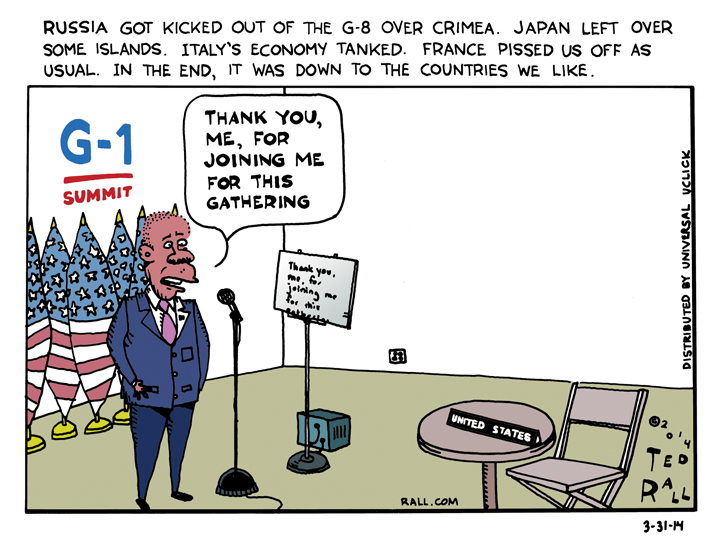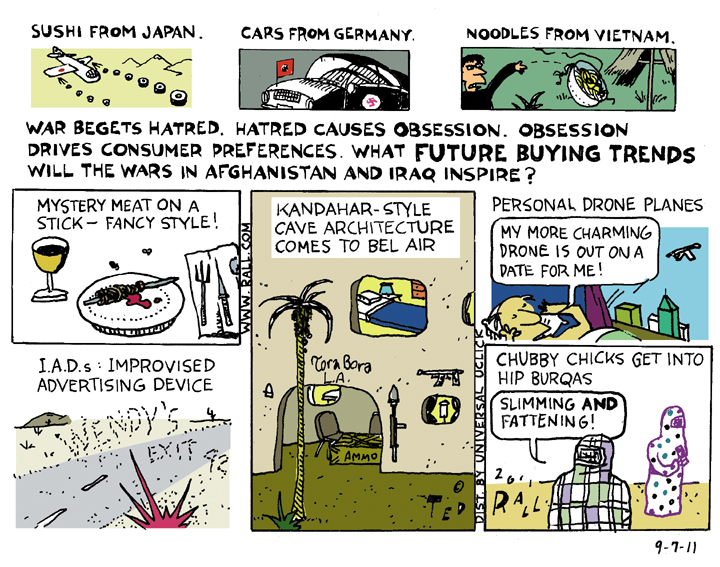Scott Stantis: Cartoonist for The Chicago Tribune
The Final Countdown – 5/18/23 –
On this episode of The Final Countdown, hosts Manila Chan and Ted Rall discuss hot topics, such as the Ukraine-Russia grain deal extension.
What Kind of Maniacs Would Use Nuclear Weapons?
Perhaps a little late now that they have painted Russia into a corner, the United States and its allies are worried that president Vladimir Putin might resort to his nuclear arsenal to retaliate against sanctions and US military aid to Ukraine. But only one country has ever been insane enough to use nuclear weapons, not once but twice, each time against civilian targets on purpose. American scientists wanted to test the effect of the atomic bomb on a civilian city without any military infrastructure.
Most Transparent Administration Ever
U.S. Senators who want to read the text of the Trans-Pacific Partnership trade agreement with Asian countries can’t get a copy to read. Instead, they have view the long, confusing document in a secret locked room where they can take notes, but not keep them. The only way they could credibly consider the agreement would be if they had a photographic memory.
SYNDICATED COLUMN: Why Are We At War with ISIS?

Is there any justification at all for bombing ISIS?
There isn’t any Congressional authorization, much less a declaration of war. Is there even a good reason for the U.S. to be involved?
There is no better time to ask this question than now, as much of the world (me included) is disgusted by the Islamic State’s beheadings of two kidnapped Japanese nationals, the second one an acclaimed journalist and humanist who lost his life trying to rescue the first.
It is easy to forget, too easy, that for Americans going to war was until recently an act undertaken only after every other alternative had been thoroughly explored and completely exhausted, that the bar for casus belli was high, and that war wasn’t the standard response to outrage or international crisis, but quite unusual, a deviation from the normal order of business. Hard to imagine now, but the United States did not declare war against Germany after its U-boat torpedoed and sank the RMS Lusitania in 1915, killing 1,198 passengers, including 128 Americans. Instead, President Woodrow Wilson demanded compensation and a promise from Germany not to do it again.
War has since become much too easy.
We go to war fast, without national discussion — much less debate. We go to war indiscriminately. We war against several nations (Afghanistan, Iraq, Libya, Syria), at the same time we’re warring against a tactic (terrorism), as well as various so-called “non-state actors” (discrete branches of Al Qaeda, Khorasan, Abu Sayyaf). War, war, war, all the time. So much war we think it’s normal that, especially when someone/something/some group does something we deem wrong, like slitting the throats of reporters as GoPros record the bloodshed in glorious high resolution, war is the knee-jerk response.
Yet, as the Lusitania example reminds us, this was not always the case, and so this is not how it necessarily must be.
In just one single day over the past weekend, the U.S.-led coalition carried out 27 airstrikes against ISIS-held territory in Syria and Iraq. We have no way to know how many ISIS soldiers, and civilians, were killed or wounded in those bombardments.
U.S.-led forces are responsible for at least 16,000 airstrikes against ISIS in the last six months, killing an unknown number of people — but guesstimates logically begin in the tens of thousands, including civilians. Despite all that carnage, the air campaign has not had the desired effect: ISIS is stronger than ever, continuing to conquer new territory and consolidate control over old ground, and the authoritarian government of Syrian President Bashar al-Assad, an adversary of the U.S. its ally Israel, is benefiting as well.
American war officials concede that the air war is failing. “I think [the war against ISIS] may require a forward deployment of some of our troops,” U.S. Secretary of Defense Chuck Hagel told CNN. “I would say we’re not there yet. Whether we get there or not, I don’t know.”
“This is going to be a long, nasty, dirty war that in many ways is going to look a lot like the first go-around in Iraq,” Stephen Biddle, ex-adviser to Army General David Petraeus, told U.S. News & World Report.
But…why?
Why are we in this “long, nasty, dirty war” against ISIS?
Why aren’t we asking why we are at war against ISIS?
No one is arguing that the Islamic State is run by nice people. ISIS has carried out ethnic cleansing, enslaved women, raped children, slaughtered POWs in summary executions and Talibanized areas under their control, imposing their brutal, brutal medieval version of Sharia law on citizens accustomed to modern life under socialist, secular states.
But ISIS is not alone in its barbarism.
Saudi Arabia routinely carries out public beheadings and floggings, as well as crucifixions, and treats women like dirt. Yet we don’t bomb them. To the contrary, the Saudis are close allies. President Obama cuts short important diplomatic trips in order to join the Saudis as they mourn their dead king.
Another close U.S. ally, the government of the Central Asian republic of Uzbekistan, either boils or freezes political dissidents to death, depending on the government’s mood. Quirky! No air raids there either.
Among the worst nations on earth for human rights abuses are Yemen and Pakistan, both of which like ISIS are fundamentalist Islamist regimes, but receive hundreds of millions of dollars in American weapons and cash.
So what’s special about ISIS? Why did we go to war against them?
“When it comes to human rights abuses, they (Islamic State militants) are in a class of their own,” Senator Barbara Boxer (D-CA) said last summer in support of a Congressional resolution supporting America’s newest war. But that’s not true. ISIS is no worse than any number of other regimes we choose to leave alone (or actively support).
The New York Times’ editorial board says ISIS “poses a dire threat to the United States and its allies.” How so? They can’t attack the U.S. Yes, they’re in Iraq, which we kinda sorta view as an ally after invading it, but that war was lost in 2003. ISIS can’t invade Israel. So why are we attacking them? And why aren’t we asking why?
War is serious business. It takes lives, costs money, destroys infrastructure and the environment, and creates new problems, including laying the ground for future wars. The least — the very least — we can do is think about it, and talk about it, before starting one, and then letting inertia carry it on.
(Ted Rall, syndicated writer and cartoonist for The Los Angeles Times, is the author of the new critically-acclaimed book “After We Kill You, We Will Welcome You Back As Honored Guests: Unembedded in Afghanistan.” Subscribe to Ted Rall at Beacon.)
COPYRIGHT 2015 TED RALL, DISTRIBUTED BY CREATORS.COM
G-1
SYNDICATED COLUMN: The Mayors of Brokesville
To Be Young, Technodouchey and Shilly at SXSW
It’s not like I didn’t know what I was getting into.
This was my second year at South by Southwest, the Austin music festival that has morphed into a trilateral Comic Con of the tattered remnants of the music industry, the on-the-ropes independent film sector, and a New Third Thing, the tantalizingly monetizable-for-a-few culturo-fiscal tsunami that left the first two that way, which SXSW hath dubbed Interactive.
Which is, of course, the Internet. Or more exactly, the hapless wretches who want to make money from it because, this being 2013, what else are they going to do – build real stuff and sell it? They seek to profit directly, by coming up with an awesome app like Foursquare which, as every article about this topic is required by law to mention, launched at SXSW in 2009 (and which said articles are never allowed to say, is pretty boring and useless and lame and, anyway, isn’t it kind of sad to have to point back four years to find a Big SXSW Launch?). Either that, or indirectly – by sucking dry a gullible VC (venture capitalist).
In case you’re wondering what goes on SXSW and why you should care, here’s what (why comes later; feel free to skip ahead, I would if I didn’t have to write this):
It’s a bunch of incredibly douchey – you think you know douche? you think you’ve met douches? oh, no, not like these douches you don’t – 25-to-37-year-old wannabentrepreneurs trying to market Webby things, 99% of which are apps for smartphones. And 99% of those 99% of those apps are redundant.
Redundant as in: “You can find restaurants in your area and review them. You can talk to other patrons about them in our online community.”
“Like Yelp?”
“Yeah, well, yes, but…”
“Like Yelp?”
Sad confused face.
I told you they were douches.
Speaking of which:
So during SXSW 2012 I wandered down to the lobby of my hotel to get coffee. Some douches were ambling zombie-aimlessly around, heads cocked in the familiar 20°-forward-head-tilt-toward-iPhone position. Other douches were clustered on the floor, deeply engaged in a random hackathon that accomplished little more than stressing the Hilton’s already technorati-overburned wi-fi network. But that still left other douches to notice that I wasn’t wearing shoes.
“Dude,” a tall male douche, about 32 years old, smiled at me. And pointed at my feet.
“What?” I asked, grouchily. Which was appropriate, considering that he was standing between me and the coffee line. Which was long. Shilling redundant apps requires caffeine as well as gall.
“No shoes,” he replied. “What are you promoting?” He actually seemed interested in my answer to his question.
Another douche, apparently the first douche’s comrade, joined us. “Hey, that’s great!” the second douche chimed in. “Are you repping a foot app? A shoe app? What is it? I gotta know! Hey guys” – he motioned toward a small douche-flock – “check it out!”
They were visibly, crushed-like-kids-who-got-lame-presents-on-Christmas-morn disappointed by my explanation, which was boring and simple: I didn’t feel like putting on shoes since I was just going back upstairs to my room. They thought I was lying.
“No one just doesn’t wear shoes,” the first douche accused. “You are promoting something.” Because, you know, the way you promote a product is by refusing to admit it.
To paraphrase Bruce Springsteen and Dave Edmunds, from big dumb things small dumb things one day come. So what came out of tens of thousands of douches dropping millions of dollars into Austin’s tourism industry?
“The breakout star of [the 2012] SXSW was Highlight, a location-aware app that alerts you when people you know are nearby, and attempts to introduce you to people you might want to know,” the Austin Business Journal reported. “Highlight dominated the buzz at the conference and was crowned the winner early on. However, it struggled to expand afterward because it was a battery hog, and it didn’t work as well outside of SXSW’s target-rich environment, where everyone was using it.” Which is why you’ve never heard of it.
So anyway, this year was more of the same. It was depressing and maddening. Except, without anything as thrilling as Highlight. It was also enlightening. Because SXSW is a metaphor for what’s going on in the American economy.
Like most U.S. businesses, SXSW attendees wanted to sell stuff. The problem was, no one wanted to buy, or hire, or invest.
So no one was selling or getting hired or invested in.
If the balance in Austin at SXSW and in the U.S. (and for that matter internationally) were less extreme – if, in Marxist terms, the oversupply of production merely exceeded rather than dwarfed consumer demand – you’d merely have downward pressure on wages and prices. Which, in fact, we’ve seen since the end of the Vietnam War. And isn’t good.
As things stand, the demand side – companies that want to hire people, which increases the number of goods and services consumers want to buy – is virtually nonexistent. And that’s catastrophic. The U.S. economy added 177,000 jobs in January, 237,000 in February, and 158,000 in March. Moody’s Analytics chief economist Mark Zandi estimates that overall growth is running at about 175,000 a month. Since the U.S. needs to add 180,000 jobs per month just to keep up with population growth, the U.S. in “recovery” is losing 5,000 jobs a month. “If that’s the case, underlying job growth is not changed appreciably,” Zandi says dryly.
Sassy ex-Reagan budget chief David Stockman – say what you will about his blame-the-Fed politics, he’s the most thrilling economist-writer ever – says America is doomed because of failed government intervention. “The United States is broke — fiscally, morally, intellectually — and the Fed has incited a global currency war (Japan just signed up, the Brazilians and Chinese are angry, and the German-dominated euro zone is crumbling) that will soon overwhelm it. When the latest [Wall Street] bubble pops, there will be nothing to stop the collapse.”
Stockman is probably wrong about the why – more old-fashioned socialist state control would have avoided or at least mitigated this mess by redistributing wealth, thus stimulating consumer demand – but right about the what. When you’ve got a marketplace full of would-be sellers but no one who wants to buy, you’ve got no market at all.
All that’s left is a bunch of douchebags looking at your feet.
(Ted Rall’s website is tedrall.com. His book “After We Kill You, We Will Welcome You Back As Honored Guests: Unembedded in Afghanistan” will be released in November by Farrar, Straus & Giroux.)
COPYRIGHT 2013 TED RALL
AL JAZEERA COLUMN: Tied to a Drowning Man
The interconnectedness of the world economy means that US economic woes will have severe effects on others.
During the Tajik Civil War of the late 1990s soldiers loyal to the central government found an ingeniously simple way to conserve bullets while massacring members of the Taliban-trained opposition movement. They tied their victims together with rope and chucked them into the Pyanj, the river that marks the border with Afghanistan. “As long as one of them couldn’t swim,” explained a survivor of that forgotten hangover of the Soviet collapse as he walked me to one of the promontories used for this act of genocide, “they all died.”
Such is the state of today’s integrated global economy.
Interdependence, liberal economists believe, furthers peace—a sort of economic mutual assured destruction. If China or the United States were to attack the other, the attacker would suffer grave consequences. But as the U.S. economy deteriorates from the Lost Decade of the 2000s through the post-2008 meltdown into what is increasingly looking like Marx’s classic crisis of late-stage capitalism, internationalization looks more like a suicide pact.
Like those Tajiks whose fates were linked by tightly-tied lengths of cheap rope, Europe, China and most of the rest of the world are bound to the United States—a nation that seems both unable to swim and unwilling to learn.
The collapse of the Soviet Union, a process that began in the 1970s and culminated with dissolution in 1991, had wide-ranging international implications. Russia became a mafia-run narco-state; millions perished of famine. Weakened Russian control of Central Asia, especially Afghanistan, set the stage for an emboldened and highly organized radical Islamist movement. Not least, it left the United States as the world’s last remaining superpower.
From an economic perspective, however, the effects were basically neutral. Coupled with its reliance on state-owned manufacturing industries to minimize dependence upon foreign trade, the USSR’s use of a closed currency ensured that other countries were not significantly impacted when the ruble went into a tailspin.
Partly due to its wild deficit spending on the gigantic military infrastructure it claimed was necessary to fight the Cold War—and then, after brief talk of a “peace dividend” during the 1990s, even more profligacy on the Global War on Terror—now the United States is, like the Soviet Union before it, staring down the barrel of economic apocalypse.
AL JAZEERA COLUMN: Censorship of Civilian Casualties in the US
US mainstream media and the public’s willful ignorance is to blame for lack of knowledge about true cost of wars.
Why is it so easy for American political leaders to convince ordinary citizens to support war? How is that, after that initial enthusiasm has given away to fatigue and disgust, the reaction is mere disinterest rather than righteous rage? Even when the reasons given for taking the U.S. to war prove to have been not only wrong, but brazenly fraudulent—as in Iraq, which hadn’t possessed chemical weapons since 1991—no one is called to account.
The United States claims to be a shining beacon of democracy to the world. And many of the citizens of the world believes it. But democracy is about responsiveness and accountability—the responsiveness of political leaders to an engaged and informed electorate, which holds that leadership class accountable for its mistakes and misdeeds. How to explain Americans’ acquiescence in the face of political leaders who repeatedly lead it into illegal, geopolitically disastrous and economically devastating wars of choice?
The dynamics of U.S. public opinion have changed dramatically since the 1960s, when popular opposition to the Vietnam War coalesced into an antiestablishmentarian political and culture movement that nearly toppled the government and led to a series of sweeping social reforms whose contemporary ripples include the recent move to legalize marriage between members of the same sex.
Why the difference?
Numerous explanations have been offered for the vanishing of protesters from the streets of American cities. First and foremost, fewer people know someone who has gotten killed. The death rate for U.S. troops has fallen dramatically, from 58,000 in Vietnam to a total of 6,000 for Iraq and Afghanistan. Many point to the replacement of conscripts by volunteer soldiers, many of whom originate from the working class, which is by definition less influential. Congressman Charles Rangel, who represents the predominantly African-American neighborhood of Harlem in New York, is the chief political proponent of this theory. He has proposed legislation to restore the military draft, which ended in the 1970s, four times since 9/11. “The test for Congress, particularly for those members who support the war, is to require all who enjoy the benefits of our democracy to contribute to the defense of the country. All of America’s children should share the risk of being placed in harm’s way. The reason is that so few families have a stake in the war which is being fought by other people’s children,” Rangel said in March 2011.
War is extraordinarily costly in cash as well as in lives. By 2009 the cost of invading and occupying Iraq had exceeded $1 trillion. During the 1960s and early 1970s conservatives unmoved by the human toll in Vietnam were appalled by the cost to taxpayers. “The myth that capitalism thrives on war has never been more fallacious,” argued Time magazine on July 13, 1970. Bear in mind, Time leaned to the far right editorially. “While the Nixon Administration battles war-induced inflation, corporate profits are tumbling and unemployment runs high. Urgent civilian needs are being shunted aside to satisfy the demands of military budgets. Businessmen are virtually unanimous in their conviction that peace would be bullish, and they were generally cheered by last week’s withdrawal from Cambodia.”




